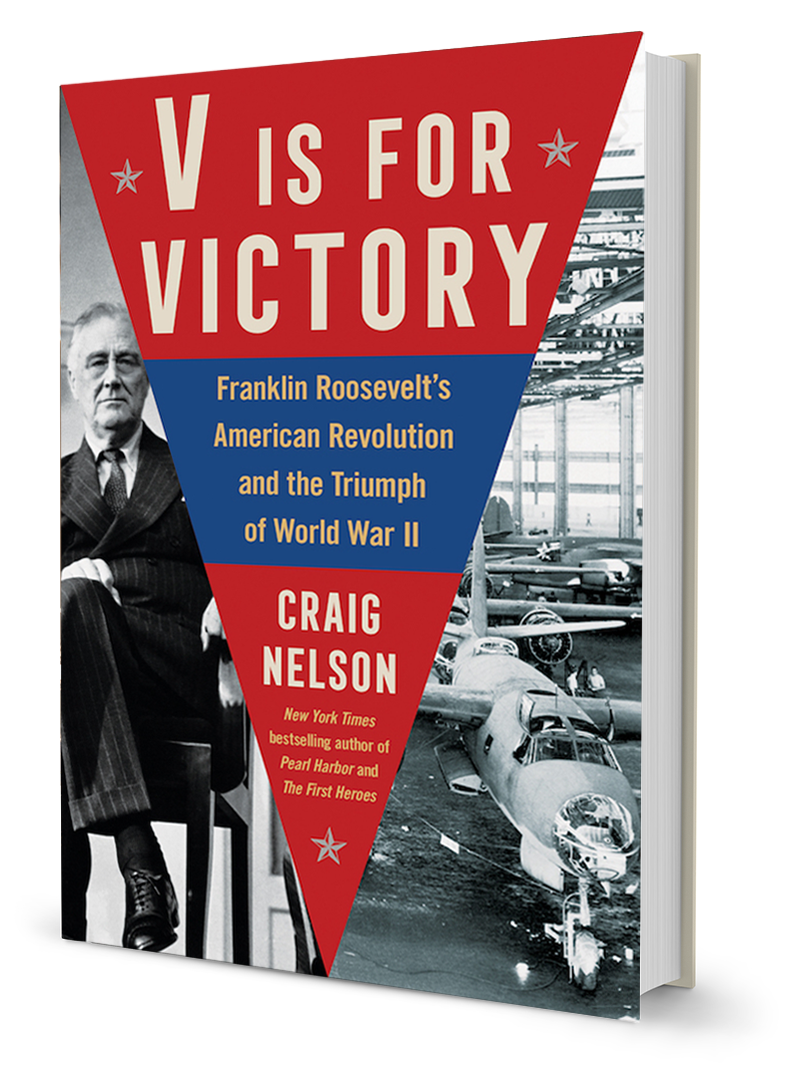Praise
On becoming President, in 1933, Franklin D. Roosevelt faced two daunting tasks: to pull the country out of the Depression and, in the face of Nazism’s rise, to overcome U.S. isolationism. Such was his success, this paean to F.D.R. contends, “that, if any one human being is responsible for winning World War II, it is FDR.” Nelson focusses on the ways in which New Deal economics and a nascent war effort went hand in hand, as with the bond-sales programs that financed the “arsenal of democracy” policy, and shows us Roosevelt wrangling generals and manufacturers alike. He sees America’s “industrial genius”—factories producing everyday items were enlisted to make armaments—as central to the defeat of fascism, arguing that American workers were war heroes, too.
— The New Yorker
V is For Victory belongs in the library alongside the histories and biographies of Martin Gilbert, Arthur Schlesinger, Jr., and David McCullough. Immensely readable and engrossing, rich in detail, deeply reported, these pages posses that rare charm of omniscience flush with surprise at every turn. Nelson’s prose springs FDR and America to new life— we’re in the rooms as history is made. A rich feast of history and storytelling.
— Doug Stanton, #1 New York Times bestselling author of Horse Soldiers
Historian Nelson (Rocket Men) claims in this comprehensive and colorful account that Franklin Roosevelt’s New Deal kicked off a third American Revolution that pulled the nation out of the Great Depression and tipped the scales toward Allied victory in WWII. … Deeply researched and fluidly written, this is a rousing portrait of the partnership between America’s public and private sectors firing on all cylinders.
— Publisher’s Weekly
Time and again, Roosevelt’s foresight and leadership saved the world. Craig Nelson recounts this most essential of all American stories with epic sweep and telling detail. In our time of great strife and fear, his powerful book inspires hope that, like America under FDR, we, too, can build a better future.
—Marc Wortman, author of 1941: Fighting the Shadow War: A Divided America in a World at War
Most scholars agree that industry was the deciding factor in the war, but Nelson, bestselling author of Pearl Harbor and Rocket Men, gives it his full and expert attention. ….
While most historians emphasize military icons (Marshall, Eisenhower, Nimitz) Nelson concentrates on relatively obscure civilian figures such as Donald Nelson, Bill Knudsen, and Edward Stettinius Jr., “dollar-a-year patriots who relinquished the comparatively mild civil-service salary that would normally be their due.” The industrial miracle they oversaw was far more complex than anyone had predicted, so politicians, generals, and the media at the time have looked down on them, but Nelson doesn’t. This hyperproduction continued after the war was over, when the U.S. helped rebuild the world and gave birth to one of the first affluent, consumer societies in which, for a generation, the middle-class made up the majority. …
A strong argument that “if any one human being is responsible for winning World War II, it is FDR,” [and] a compelling and convincing history lesson.
— Kirkus (Starred Review)
Here it is – the story behind the story – the compelling chronicle of President Franklin D. Roosevelt’s leadership to build the fabled arsenal of democracy brick by brick, bolt by bolt. In Craig Nelson’s highly compelling account, readers will meet Roosevelt’s team of politicians, industrialists, entrepreneurs, and bureaucrats who pulled America from the depths of the Great Depression, fought a multi-front world war against fascism, and emerged from victory as a world leader. V is for Victory is an engrossing contribution to World War II history.
— James M. Fenelon, author of Angels Against the Sun and Four Hours of Fury
There are plenty of battles that were crucial to the Allies’ victory in World War II, and even more books chronicling them. But the key fight didn’t occur on any battlefield — the battle to win over the public and industry’s support for the war effort. That’s the focus of Craig Nelson’s “V Is For Victory,” a solid history of President Franklin Delano Roosevelt’s success in fighting back against isolationist tendencies brewing in the country to rally the public’s support and marshal the supplies needed to win the war. … Though some of the book may seem familiar for WWII history buffs, Nelson manages to make what is essentially a history of logistics just as compelling as battlefield heroics.
—Associated Press
Craig Nelson’s lucid prose invites his readers into the opaque workings of FDR’s mind. Across a wide-ranging account of Roosevelt’s sublime and at times manipulative grasp of every aspect of American involvement in World War II—from politics and diplomacy to strategy and operations to social and economic issues—V is for Victory is a revelation of a master leader on the world stage.
— Thomas Alexander Hughes, Professor of History and Dean of Academics, School of Advanced Air and Space Studies, and author of Admiral Bill Halsey and Overlord
Craig Nelson has written a brilliantly researched and compellingly-written story of the American home front at war. The book inspires as it instructs.
— Laurence Leamer, author of Capote’s Women
In this study of FDR’s brilliance before and during World War II, Nelson proves he is the master of mixing startling political concepts (FDR began preparing America for victory in World War II in the mid-1930s) with captivating close-up vignettes (“Good Will Ambassador” Harpo Marx smuggling papers out of Moscow in his socks; Ernest Hemingway— drunk and clutching a hand grenade— searching the North Atlantic for Nazi submarines).
Each page of this book crackles with an historian’s insight, a scientist’s research, a writer’s confidence, and a storyteller’s charm.
— Jim DeFilippi, author of The Mules of Monte Cassino
Gifted storyteller Craig Nelson weaves together the fascinating backgrounds of the men and women – some famous, most lesser known – who built the machine that defeated Germany and Japan. These heroes (along with a few villains) creatively met the challenges laid down by a president who “took his stand against the advice of some of this country’s best minds” and whose “foresight saved us all.”
— Bill Whiteside, author of The Barbarians Sat Back and Laughed







